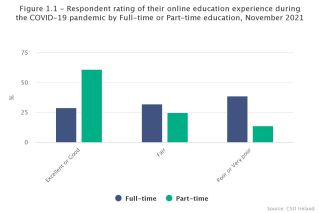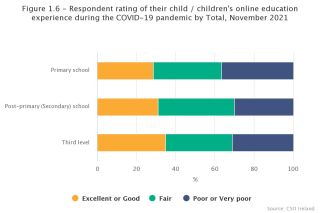Remote learning in Ireland

A CSO analysis of Remote Learning from the ‘Our Lives Online’ CSO Pulse Survey provides insights into online education experienced by survey respondents during the COVID-19 pandemic with additional analysis provided on future online learning opportunities. A CSO analysis of Remote Learning from the ‘Our Lives Online’ CSO Pulse Survey provides insights into online education experienced by survey respondents during the COVID-19 pandemic with additional analysis provided on future online learning opportunities.
Respondents were asked a series of questions about their online education experience during the pandemic and their plans for returning to education in the future. In addition, respondents with children in school and college were asked to rate their children's online education experiences during COVID-19.
The results show that overall, more than four in 10 (42%) respondents whose educational course continued online as pandemic restrictions were introduced rated their online education experience as Excellent or Good. However, there are significant differences between those in part-time education and those in full-time education. Less than three in 10 (29%) respondents in full-time education rated their online education experience during the pandemic as Excellent or Good. For those in part-time education more than six in 10 (61%) respondents rated their online education experience during the pandemic as Excellent or Good.
Similarly, there was a difference by age cohort with two-thirds of those aged 45 years and older but just one-quarter of those aged between 18 to 24 years said their online education experience during the pandemic was Excellent or Good.
Our Lives Online: Remote Learning – main findings
- Less than one in three (29%) respondents in full-time education rated their online education experience during the pandemic as Excellent or Good
- More than six in 10 (61%) respondents in part-time education rated their online education experience during the pandemic as Excellent or Good
- Almost half (47%) of respondents in education who rated their home broadband as Poor rated their online education experience during the pandemic as Poor or Very poor
- Three-quarters (76%) of those in employment who plan to return to education in the future would choose a course that consisted of remote or blended learning
- One in three (33%) respondents with one child and more than four in 10 (41%) respondents with three or more children who did not plan to return to education in the future said they would reconsider it if remote or blended learning was available
- Some 40% of those with Level 8 education (Honours Bachelor Degree) or above were more likely to reconsider a return to education if remote or blended learning was available than those with Level 7 education (Ordinary Bachelor Degree) or below (29%)
- Less than three in 10 (29%) parents rated their primary school children’s online education experience during the pandemic as Excellent or Good, this increased to 31% for parents of secondary school children and to 35% for parents of third level students
Online education experience – overall rating
- As the COVID-19 pandemic took hold in Ireland (March 2020) 16% of respondents were in education (9% full-time and 7% part-time). Of these more than nine in 10 (93%) said their course continued online.
- Overall, more than four in 10 (42%) respondents in full or part-time learning whose educational course continued online as pandemic restrictions were introduced rated their online education experience as Excellent or Good. See Figure 1.1.
- Almost half (46%) of female respondents rated their online education experience as Excellent or Good compared with just 38% for male respondents.
- Two-in-three (66%) of those aged 45 years and older rated their online education experience as Excellent or Good, whereas for those aged 18 to 24 years just over one-in-four (26%) rated their online education experience that way.
- Similarly, less than three in 10 (29%) respondents in full-time education rated their online education experience as Excellent or Good with this figure rising to more than six in 10 (61%) for those in part-time education. See Figure 1.1
- Over half (52%) of respondents in full or part-time education from the Border Region (Cavan, Donegal, Leitrim, Monaghan and Sligo) rated their online education experience as Excellent or Good
- Those who rated their own General Health as Fair, Bad or Very bad (37%) were more likely to rate their online education experience as Poor or Very poor compared to those who rated their General Health as Good or Very good (27%).
- Less than one in 10 (9%) respondents in retirement rated their online education experience as Poor or Very poor, whereas for students it was more than four in 10 (41%).
- Almost half (47%) of respondents in education who rated their home broadband as Poor also rated their online education experience as Poor or Very poor. This figure fell to just one in four (25%) for those who rated their home broadband as Excellent.

Rating of online learning primary level, second level and third level
Primary
- Overall, less than three in 10 (29%) respondents who were parents of primary school children rated their children's online education experience during the pandemic as Excellent or Good. See Figure 1.6.
- A higher proportion of female parents (30%) rated their primary school children's online education experience during the pandemic as Excellent or Good compared to male parents (26%).
- Parents aged 18 to 34 years were in the age group that was least satisfied with 41% of them rating their primary school children's online education experience during the pandemic as Poor or Very poor, while parents aged 35 to 44 years were in the age group who were most satisfied with 32% rating their primary school children's online education experience during the pandemic as Excellent or Good.
- Parents who were Unemployed or In receipt of the Pandemic Unemployment Payment were the Primary Economic Status most satisfied with their primary school children's online education experience during the pandemic with almost half (48%) saying their experience was Excellent or Good. This compares to just over one in four (26%) who were In employment and 17% who themselves were Students.
- More than one in three (34%) who rated their home broadband as Excellent also rated their primary school children's online education experience during the pandemic as Excellent or Good. However, for those whose self-rated broadband was Poor, they saw their satisfaction with their primary school children's online education experience fall to just 18%.
Post-primary
- Overall, more than three in 10 (31%) respondents who were parents of children in post-primary (secondary) school rated their children's online education experience during the pandemic as Excellent or Good. See Figure 1.6.
- A higher proportion of parents with Level 8 education or above (35%) rated their post-primary (secondary) school children's online education experience during the pandemic as Excellent or Good when compared to those with Level 7 education or below (27%). See Table 1.4.
- Just 14% of parents with children in post-primary (secondary) school who rated their children's online education experience during the pandemic as Excellent or Good rated their home broadband as Poor. Whereas, for those with Excellent broadband the proportion rose to almost four in 10 (38%).
Third-level
- Overall, 35% of respondents who were parents with children in third-level education rated their children's online education experience during the pandemic as Excellent or Good.
- A higher proportion of male parents (38%) rated their children's third-level online education experience during the pandemic as Excellent or Good when compared to female parents (33%).
- More than four in 10 (41%) parents aged 35 to 44 year with children in third Level rated their children's online education experience during the pandemic as Excellent or Good. This proportion fell to 32% for those parents aged 45 to 54 years.

Return to education in the future
- More than three in 10 (35%) respondents (excluding those whose Primary Economic Status was Student) said they plan to return to education in the future did.
- Of these, overall, almost three-quarters (74%) of respondents who plan to return to education in the future said they would be more likely to choose a course that consisted of remote or blended learning.
- Those aged 35 - 44 years were in the age group most likely to choose a course that consisted of remote or blended learning.
- Respondents living in the South-East (Carlow, Kilkenny, Waterford and Wexford) and Mid-East (Kildare, Louth, Meath and Wicklow) were in the regions most likely to choose a course that consisted of remote or blended learning.
- Respondents In employment (76%) were the Primary Economic Status most likely to choose a course that consisted of remote or blended learning.
- Those with education Level 8 or above (76%) were more likely to choose a course that consisted of remote or blended learning than those with Level 7 or below (69%).
- More than three-quarters (76%) of those who were not in education when the pandemic began said they would be more likely to choose a course that consisted of remote or blended learning in the future.
- Overall, 35% of respondents, excluding those whose Primary Economic Status was Student, who when initially asked if they plan to return to education in the future said no, indicated that they would reconsider it if remote or blended learning was available.
- Those aged between 18 - 34 years were in the age group most likely to return to education in the future if remote or blended learning was available. As age increased the likelihood of a consideration to return to education if remote or blended learning was available decreased.
- More than four in 10 (44%) respondents whose Primary Economic Status was Unemployed or In receipt of the Pandemic Unemployment Payment said they would consider a return to education if remote or blended learning was available.
- More than one in three (34%) respondents who rated their home broadband as Excellent compared to just under three in 10 (29%) who rated theirs as Poor would consider a return to education if remote or blended learning was available.
Policy implications
Ireland has made welcome progress on lifelong learning rates in recent years. Although our participation rate has been slowly improving (reaching 13% in 2019), those engaged in lifelong learning are still more likely to be professionals than those with lower skills[1]. This trend is not confined to Ireland, Europe as a whole has faced challenges in improving lifelong learning participation rates for adults with lower skills.
High quality education and training accessible for all is one of the best investments a society can make but it does not come for free. Achieving good educational outcomes requires appropriate spending[2]. Lifelong learning is essential to ensure Ireland can meet the challenges that automation and adaptation pose to the future of work. A report from the European Commission found that the transition from education and training to work and then from one job to another is crucial and requires continuous upskilling and reskilling of the adult population[3]. Comprehensive investment strategies in education and training, which cover all stages of life, bring the highest social and economic returns.
The pandemic has had a major impact on the delivery of education and training, particularly in the area of apprenticeships and vocational training. Although there may be a temptation to focus on the online delivery of lifelong learning and education and training due to the impact of the pandemic, this would be detrimental to achieving our education and training ambitions. The crisis provided a powerful test of the potential of online learning, and it also revealed its key limitations, including the prerequisite of adequate digital skills, computer equipment and internet connection to undertake training online, the difficulty of delivering traditional work-based learning online, and the struggle of teachers used to classroom instruction[4]. An OECD study found that in addition to basic digital skills, online learning requires autonomy and self-motivation. Users of online learning are primarily highly educated adults with strong digital skills and some courses show completion rates as low as 10%. The study concludes that for or online learning to represent a valuable alternative to face-to-face instruction, it needs to tackle issues of inclusiveness to ensure all adults (including those with lower digital skills, limited access to IT and lower self motivation) can benefit. It also needs to provide high-quality reskilling and upskilling opportunities that can translate into sustainable employment opportunities for job seekers[5].
The results of the CSO survey into remote learning reflects the findings of these earlier reports. If Ireland is to meet lifelong learning targets, then a fully resourced programme, with the correct blend of remote and in-person learning is required. Policy must also ensure that people are not excluded due to digital or broadband issues when it comes to engaging in lifelong learning and skills development.
[1]https://www.regionalskills.ie/imagelibary/regional%20skills%20-%20natio…
[2]https://ec.europa.eu/info/sites/info/files/economy-finance/dp139_en.pdf
[3]https://ec.europa.eu/info/sites/info/files/economy-finance/dp139_en.pdf
[4]https://www.oecd.org/coronavirus/policy-responses/the-potential-of-onli…
[5]https://www.oecd.org/coronavirus/policy-responses/the-potential-of-onli…